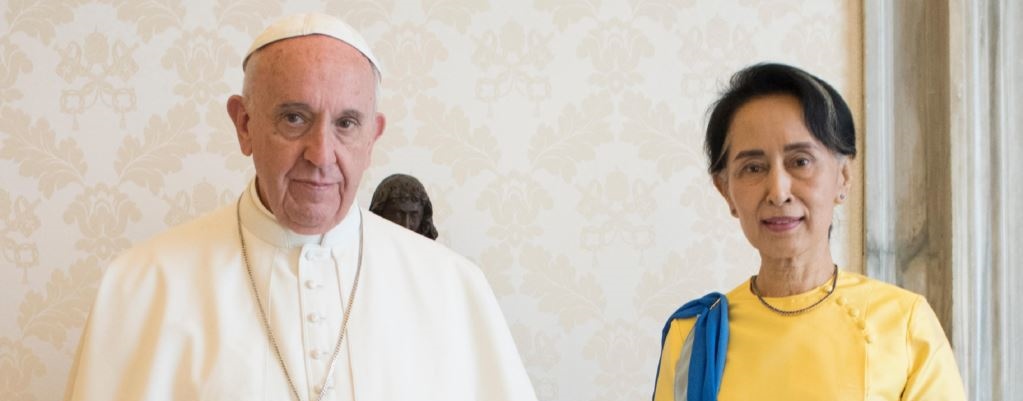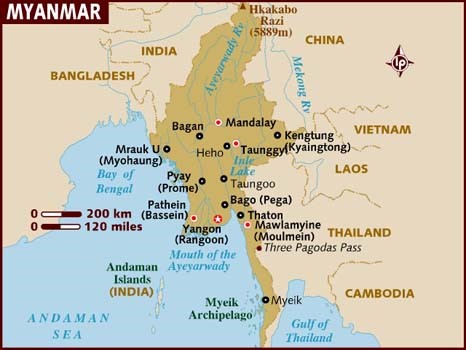Pope Francis in Myanmar
November 29, 2017 | Expert Insights

Pope Francis, who visited Myanmar preached the importance of peace in a nation embattled by violence.
In his keynote address, the Pope did not mention Rohingya Muslims but spoke on behalf of a a democratic order which "enables each individual and every group - none excluded - to offer its legitimate contribution".
Background
The Rohingya are a stateless Indo-Aryan people from Rakhine State, Myanmar. There were an estimated 1 million Rohingya living in Myanmar before the 2016–17 crisis. Even prior to the crisis, they were considered one of the most persecuted groups in the world. The government considers them illegal refugees from Bangladesh and they aren’t allowed to vote. However, the Bangladeshi government considers them Burmese, effectively rendering them stateless.
Under the 1982 Myanmar nationality law, they were denied citizenship in Myanmar. Rohingya Muslims, despite not being recognized as one of the eight national races, trace their origin back to the 8th century. The process for them to get a citizenship is also extremely difficult.
Given their persecution, thousands have fled the region in boats. Due to violent riots, since 2012, over 110,000 Rohingya left Myanmar and headed to countries like Thailand and Malaysia. The number of refugees increased exponentially in 2015. Thein Sein, the Burmese President from 2011 to 2016 did little to offer relief to Rohingya.
The Rohingyas have faced military crackdowns in 1978, 1991–1992, 2012, 2015 and 2016–2017. The UN human rights envoy to Myanmar reported "the long history of discrimination and persecution against the Rohingya community... could amount to crimes against humanity.” A UN report has said that the treatment of Rohingya was tantamount to ethnic cleansing. Researchers from the International State Crime Initiative (ISCI), published a report citing compelling evidence of mass annihilation and genocide. Personal accounts by refugees paint horrific tale of rape, pillaging and violence.
Over 620,000 Rohingya Muslims have fled the region since August amid reports of violence by the military.
Pope Francis is the 266th and current Pope of the Catholic Church. He is the first Jesuit pope, the first from the Americas, the first from the Southern Hemisphere, and the first pope from outside Europe since the Syrian Gregory III, who reigned in the 8th century. Throughout his public life, Pope Francis has been noted for his humility, emphasis on God's mercy, concern for the poor and commitment to interfaith dialogue. He is credited with having a less formal approach to the papacy than his predecessors.

Analysis
In November 2017, Pope Francis visited Myanmar making him the first Pope to ever visit the southeast Asian nation. One of his own Cardinals earlier advised the Pope from not using the word “Rohingya” in fear that it might stall reconciliation efforts. A hardline Buddhist monk group previously known as Ma Ba Tha had also warned that there may be a “response” if the Pope mentioned Rohingya Muslims during his address in Myanmar.
Pope Francis’ visit to Myanmar had been planned before violence had erupted in August and was intended to upgrade diplomatic ties between the Vatican and the southeast Asian nation. In his keynote address at the nation’s capital, the most influential Christian in the world evaded using the word ‘Rohingya’ but he preached the importance of peace.
“The future of Myanmar must be peace, a peace based on respect of the dignity and rights of each member of society, respect for each ethnic group and its identity,” Francis said, speaking after Aung San Suu Kyi had made an address. The Pope did make thinly veiled references to Rohingya Muslims when he spoke about the need to "ensure respect for the rights of all who call this land their home".
Mayyu Ali, a Rohingya refugee who recently fled the violence and lives in a camp in Bangladesh, said he was disappointed the Pope did not speak more directly. “He should keep speaking up for the truth as he did before. Last year, he cited ‘Our Rohingya brothers and sisters’. And he said more about our suffering,” he said.
Pope Francis will now be heading to Bangladesh where he is expected to meet with Rohingya refugees in Dhaka.
Assessment
Our assessment is that Pope Francis being the head of the Catholic Church had to walk a diplomatic tightrope so as to not incite violence. By avoiding the name Rohingya, he headed off an angry reaction from hard-line Buddhist nationalists, saved embarrassment for Aung San Suu Kyi, the de-facto head of Myanmar and his host for the trip. However, through veiled references he urged for peace, which is one of the main tenets of Christianity.








Comments